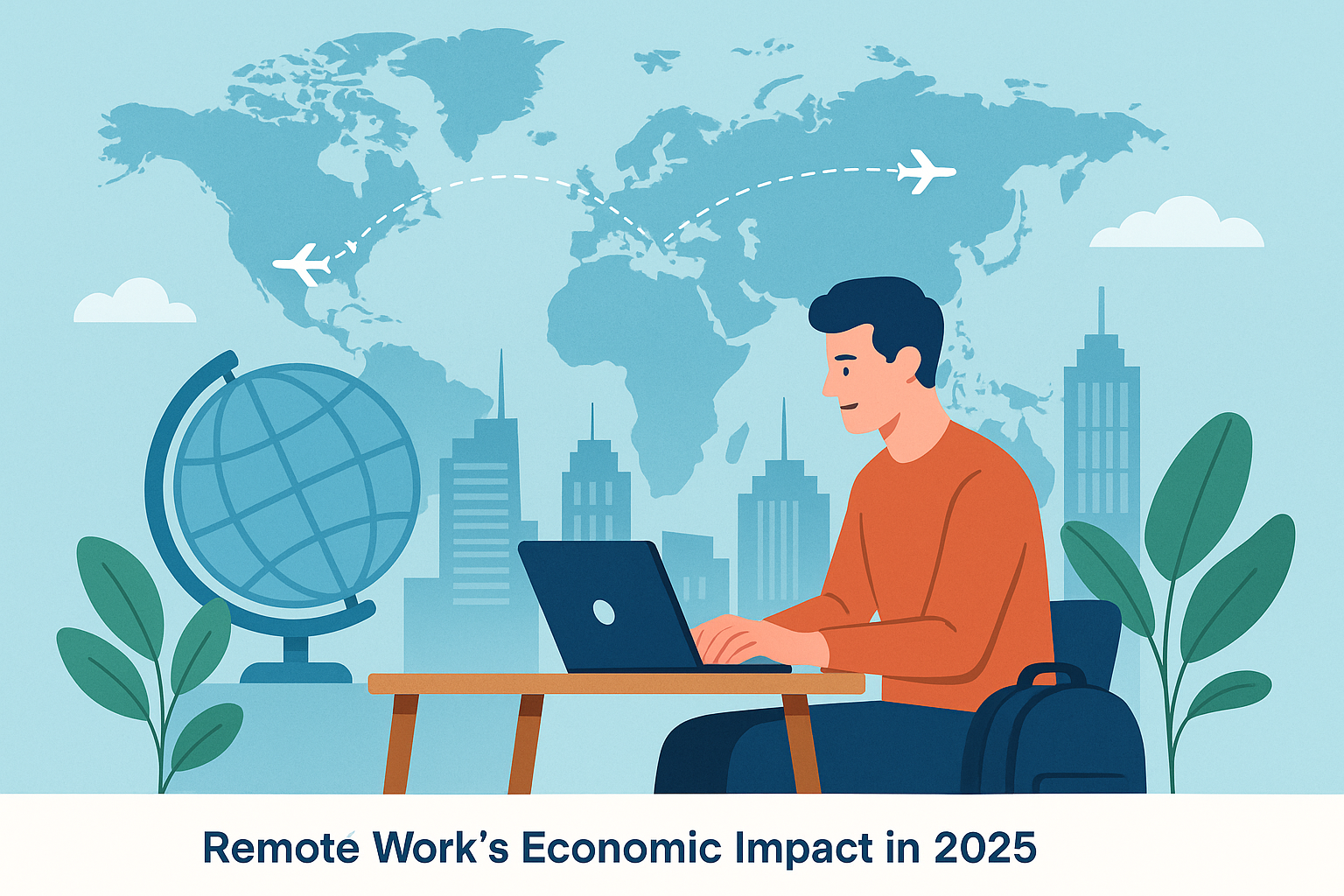A New Economic Frontier
The rise of digital nomads and remote work is no longer a trend – it is a transformative shift in the global economy. In 2025, millions of professionals are choosing location-independent lifestyles, contributing to significant changes in local economies, tax structures, global employment, and the flow of capital. As countries compete to attract this mobile workforce, the economic dynamics of remote work have become a critical area for analysis.
Who Are Digital Nomads?
Defining the Digital Nomad Lifestyle
Digital nomads are individuals who leverage digital technologies to work remotely while living a nomadic lifestyle. They typically earn income online and travel frequently, working from cafes, co-working spaces, or even beaches around the world.
Key Demographics and Growth Trends
The digital nomad population has surged past 50 million globally in 2025, with a growing share of professionals from tech, marketing, design, and consulting sectors. Millennials and Gen Z dominate this movement, drawn by flexibility, travel, and autonomy.
The Economic Impact of Remote Work
How Remote Work Is Reshaping Local Economies
Countries like Portugal, Indonesia, Mexico, and Georgia have implemented remote worker visas, driving real estate, tourism, and service sector growth. Coworking hubs and digital infrastructure investments are revitalizing smaller cities and rural areas.
Taxation and Legal Complexities
The cross-border nature of remote work presents complex challenges for taxation and employment law. Governments are adapting to capture revenue from this new labor class, while digital nomads seek low-tax or tax-exempt jurisdictions.
Currency Flow and Emerging Digital Economies
Remote workers contribute to foreign exchange inflows in host countries while spending abroad via digital banking and cryptocurrencies. This decentralized economic activity is fostering new digital-first economies in emerging markets.
Countries Leading the Digital Nomad Economy in 2025
Top Destinations for Digital Nomads
- Portugal – Affordable living, strong Wi-Fi, and a vibrant expat community.
- Thailand – Cultural richness and digital infrastructure.
- Colombia – Government-backed remote work incentives.
- Georgia – Visa-free entry and low taxes.
Remote Work Visas: A Strategic Tool
More than 60 countries now offer specialized remote work visas. These visas often come with tax incentives, residency options, and support services, turning nations into startup hubs and economic innovation zones.
Challenges and Criticisms
Gentrification and Local Displacement
In popular digital nomad hotspots, rising property prices and gentrification are pushing out local populations. Critics argue that short-term expat residents disrupt community dynamics and inflate living costs.
Labor Rights and Job Security
Remote work often means gig-based contracts, limited benefits, and job precarity. Digital nomads may lack access to health care, retirement plans, or legal protections in host countries.
The Future of Work and Policy Implications
How Governments Are Adapting
Forward-thinking governments are creating “digital economy blueprints” to accommodate remote workers, including portable tax IDs, digital ID systems, and transnational work agreements.
Role of Technology in Sustaining Remote Work
Advancements in cloud computing, cybersecurity, virtual collaboration tools, and AI project management platforms are fueling long-term sustainability of remote work.
How Are Digital Nomads Affecting the Global Economy in 2025?
Digital nomads are reshaping the global economy by redistributing income across borders, revitalizing local economies, and challenging traditional taxation models. Countries are adapting with new visa programs and digital infrastructure to attract remote workers.
Pro Tips for Digital Nomads and Policymakers
- Diversify your income sources to reduce dependency on a single market.
- Use digital banking and international tax advisors to remain compliant and optimize finances.
- Evaluate countries’ digital nomad visa policies before relocating.
- Invest in strong internet security when working across borders.
- Build passive income streams through freelancing platforms or online businesses.
- Track currency exchange rates and use fintech apps to reduce conversion losses.
Frequently Asked Questions (FAQ)
What is a digital nomad visa?
A digital nomad visa allows remote workers to legally live and work in a foreign country, usually for 6 months to 2 years, without switching to local employment.
Are digital nomads taxed in both home and host countries?
It depends. Some countries have tax treaties to avoid double taxation, but it’s essential to consult international tax advisors to ensure compliance.
What industries are most compatible with digital nomadism?
Tech, design, content creation, digital marketing, and online consulting are highly compatible with remote work and nomadic lifestyles.
Is remote work sustainable long-term?
Yes, especially with evolving technologies, global connectivity, and changing attitudes toward work-life balance. However, policy support is key to ensuring equitable growth.
How do digital nomads impact local communities?
They can boost local economies but also contribute to gentrification and housing shortages in popular destinations. Balanced urban planning is necessary.
💬 Have you ever considered becoming a digital nomad or working remotely from another country? Share your thoughts or experiences in the comments below!



